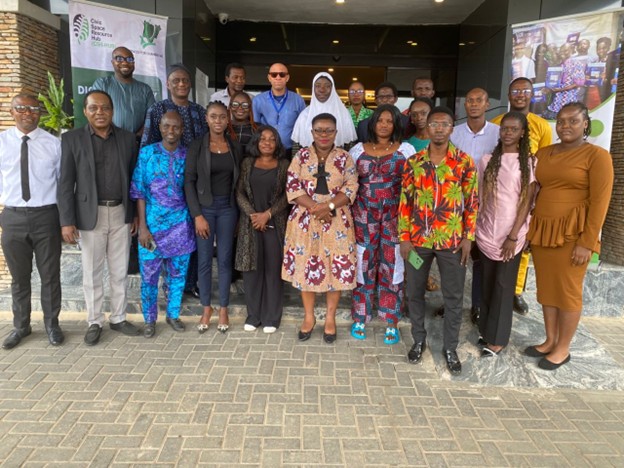
In partnership with Imo State Ministry of Environment and Sanitation, Spaces for Change|S4C convened an inception meeting of the newly-constituted Imo State Technical Committee on Climate Change on November 15, 2024. At the event, supported by the UK Institute of Development Studies (IDS) and the Ford Foundation, S4C and state authorities introduced committee members to the rationale behind setting up the Technical Committee, their mandates and timeframe for project implementation. The Technical Committee was constituted to develop a participatory and inclusive climate change policy that addresses the state’s unique climate and environmental challenges.
The meeting provided an opportunity to enhance members’ understanding of climate change, and its impact on the local environment, energy and health systems. As S4C’s opening remarks reiterated, climate change is a global phenomenon requiring localized action. Nigeria’s adoption of the Energy Transition Plan and the Climate Change Act at the national level lays the legal foundation for states, particularly those in the Niger Delta region, to domesticate these frameworks. Despite being an oil-producing region with substantial gas deposits, Imo State lacks a legal framework to guide its climate change initiatives. It is against this backdrop that S4C is partnering with the Ministry of Environment and Sanitation Imo State to develop a comprehensive climate change policy, with the responsibility now entrusted in the Technical Committee.
The workshop featured presentations from international development and health experts, shedding light on the state’s vulnerabilities to climate change as well as the challenges associated with mitigation and adaptation. Imo State currently ranks 24th out of Nigeria’s 36 states in climate governance, based on an evaluation conducted by the Department of Climate Governance. This ranking was determined using criteria such as the presence of climate institutions and governance structures, the development and execution of policy and action plans, budgetary and financial allocations, implementation and monitoring mechanisms, and online visibility. In light of this, crafting a robust and inclusive climate policy will not only strengthen the state’s response to climate challenges but also transform Imo’s narrative in the national and global climate governance landscape.
Similarly, greenhouse gases like carbon dioxide and methane, when released in excess, disrupt the earth’s balance, leading to phenomena such as warming, flooding, and droughts. These, in turn, result in direct health impacts such as loss of life and displacement, as well as indirect effects like the outbreak of diseases and increased vulnerability to gender-based violence. The encroachment on animal habitats due to climate change was also linked to the spread of zoonotic diseases such as Ebola, Lassa fever, and monkey pox, as increased human-animal interactions create new health risks. High disease transmission rates are exacerbated by the vulnerabilities within Nigeria’s health system, like the gaps in service delivery, low health workforce, inadequate medical supplies, insufficient health information systems, and the absence of universal health coverage. To address these gaps, renewable energy solutions offer new levers for strengthening healthcare delivery, improving efficiency, and addressing the brain drain among health professionals. Examples include deploying solar-powered boreholes for water supply, hydrogen-powered ambulances, and wind or hydroelectric energy systems are crucial for powering health facilities, enabling electronic medical records to reduce deforestation, and supporting green farms around hospitals for drug research. These solutions can help to bolster equitable access to healthcare and insurance for vulnerable populations.
Following these presentations, committee members provided accounts of how climate change is affecting communities in Imo State. A woman leader from in Ohuba in Ohaji Egbema Local Government Area, renowned as the food basket of Imo State, highlighted how climate change has led to the extinction of certain food items, reduced crop yields due to unfavorable weather patterns, and increased food prices. These challenges have disrupted local women’s livelihoods and adversely impacted their health. More disturbingly, insecurity stemming from herdsmen grazing on rural farmlands has escalated tensions in communities. Very worryingly, insecurity deter women from going to their farms in light of the pervasive climate of fear.
Representatives of persons living with disability elucidated the challenges that they face. To them, erosion is the most significant barrier, destroying roads, limiting mobility, and cutting off access to essential services like healthcare. These conditions leave people with disabilities particularly vulnerable, exacerbating their health challenges and mental well-being. In a recent tragic incident, a man with mobility challenges was unable to escape flooding and lost his life. That’s why it is imperative for the Committee to integrate disability-focused measures in the state’s climate change policy to ensure their needs are not overlooked.
A youth representative from Abaezi Autonomous Community in Oguta LGA, an oil-rich area, recounted the devastating gas explosion of 2022 that claimed over 100 lives and caused widespread destruction. What this means is that oil- and gas-rich communities in the state are vulnerable to such incidents, often linked to illegal oil bunkering activities. Local youth now resort to illegal bunkering as a means of livelihood as frequent floods have wiped farmlands, displaced farmers, reduced agricultural yields and extinguished traditional livelihoods. Comprehensive solutions to flooding and erosion are urgently needed, and should be considered in the proposed climate policy. Also, providing alternative livelihoods for the youth is imperative for addressing illegal oil refining and its environmental consequences. Another vital issue is the impact of waste in marketplaces. Heaps of refuse cause blocked roads and unsanitary conditions which pose significant health risks for traders and residents alike. Again, the Committee was urged to prioritize waste management as part of broader environmental and climate reforms.
Receiving these perspectives and concerns, state authorities assured the ministry’s unwavering commitment to supporting the project and liaising with other government agencies to ensure its successful implementation. Although climate change is a priority for Imo State Ministry of Environment and Sanitation, the current lack of policy guidelines, legal statutes, roadmaps, or actionable plans on climate change in the state, are sources of serious concern that require immediate and sustained action. Recognizing the time-sensitive nature of the project, the Permanent Secretary of the Ministry encouraged the committee to work diligently to produce a draft climate policy within the next few months. This draft, he suggested, should undergo a thorough stakeholder validation process and proper certification before being presented to the State House of Assembly for legislative approval. Once passed, the policy would then be forwarded to the appropriate channels for ratification, assent and adoption. He expressed confidence in the committee’s ability to execute this project successfully, with support from Spaces for Change and partners.



